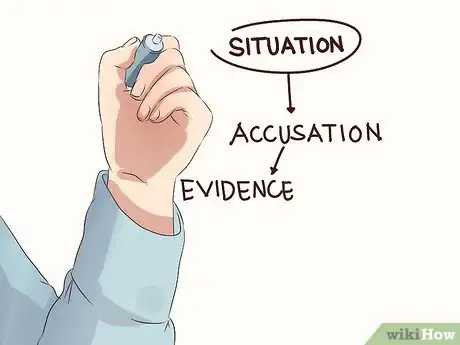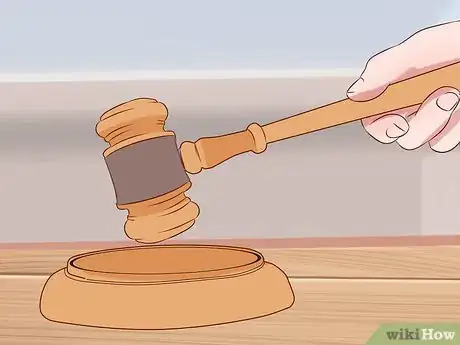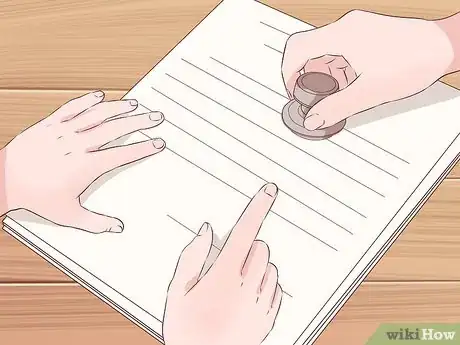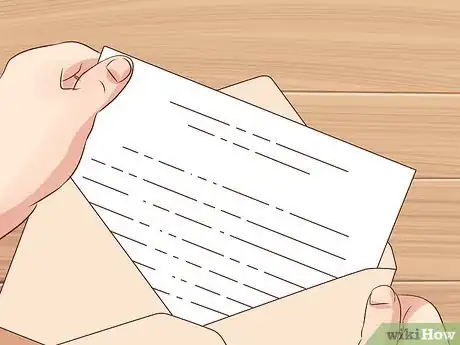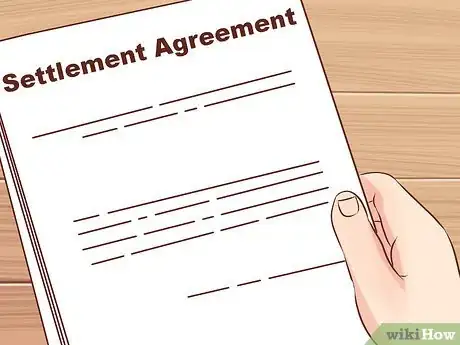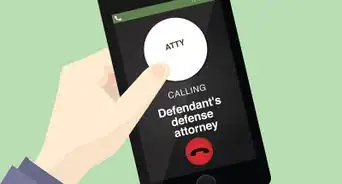This article was written by Jennifer Mueller, JD. Jennifer Mueller is an in-house legal expert at wikiHow. Jennifer reviews, fact-checks, and evaluates wikiHow's legal content to ensure thoroughness and accuracy. She received her JD from Indiana University Maurer School of Law in 2006.
There are 12 references cited in this article, which can be found at the bottom of the page.
This article has been viewed 50,431 times.
At best, false allegations can cause serious damage to your reputation. The consequences can be even more severe when someone falsely accuses you of committing a criminal act, or when that violates the rules of your workplace or an organization of which you are a member. If you've been significantly damaged by false allegations, the U.S. legal system provides a remedy. You can sue those who started or spread those allegations. Winning or even settling your case can compensate you for your losses and help repair your reputation.[1] [2] [3]
Steps
Working with an Attorney
-
1Document the false allegations. Beyond the allegations themselves, as soon as false allegations surface you should start keeping records of everything you do and every conversation you have.[4] [5]
- It may seem like overkill, but you never know when something in your careful records can serve to disprove the allegations.
- Buy a bound notebook so that all of your records are together in one place. Make your entries chronologically as soon as possible after the conversation or event occurs.
- Include as many specific facts as possible, including the date, time, and location of the conversation or event, as well as names of anyone else present.
- Sign each entry and initial each page. It also may be helpful for you to have a trusted friend or family member witness your entries.
- They don't have to watch you write each entry, but they should initial each page and be willing to testify that the handwriting is yours and that you wrote them on the date listed rather than fabricating the entire record after the fact.
-
2Find an appropriate attorney. An experienced defamation attorney will understand the laws in your state and may be able to get you more money than you could get on your own. Even if you think you can't afford an attorney, it's worth taking advantage of a free initial consultation to assess your legal options.[6] [7] [8]
- When you sue for false allegations, you're essentially suing for defamation, although the name for the actual law differs among states and depending on the way the false allegations were spread to others.
- For this reason, you need to find an attorney who has experience with defamation law and in representing clients similar to you.
- The website of your state or local bar association is a good place to start if you don't know any attorneys. Make a list of names and then interview two or three to make your choice.
- Ideally, you'll want to find an attorney who is willing to work on contingency – especially if you have limited funds. That way you won't have to pay the attorney any money up front, although they will take a percentage of any settlement or court award you receive. However, there aren't many defamation attorneys who take cases on contingency because of the tremendous uncertainty with these kinds of cases.
- You also may be able to find an attorney who is willing to take smaller, flat fees to help you out on specific aspects of your case without representing you in the case as a whole.
Advertisement -
3Outline your situation. A big part of suing for false allegations is knowing who to sue. Creating an outline of the events surrounding the false allegations can help you identify people responsible for starting or spreading the rumors.[9] [10]
- For example, it may be that a co-worker falsely accused you of violating health codes at work. This co-worker told your boss as well as several other coworkers. They also spoke with a reporter at the local newspaper.
- As a result of the story in the newspaper, you lost your job and have been unable to find work in your field – despite the fact that the allegations were false and you never violated health codes.
- By sketching out a timeline of the situation, both your former coworker and the newspaper emerge as possible defendants.
- An attorney typically will advise you that you're more likely to get a larger recovery from the newspaper than from your former coworker.
-
4Send a demand letter. A terse, well-written demand letter – especially one written by an attorney – may resolve your dispute without the need for a lengthy and expensive courtroom drama. In addition, many courts require you to make some effort to resolve a dispute before resorting to the courts.[11] [12]
- You can find sample demand letters online to guide you if you're drafting your letter yourself. Aside from introductory and closing paragraphs, your letter consists of sections outlining the facts, discussing the person's legal liability, and describing the damages you suffered as a result.
- Damages suffered as a result of false allegations can be difficult to calculate. You will have actual damages – such as if you lost your job, had to pay various bills or expenses, or were passed up for a promotion or other benefits.
- However, you also have damages from emotional distress, and these can be significantly more difficult to pin to a dollar amount. You may want to look at awards in cases similar to yours to get an idea.
- Even if you haven't hired an attorney to represent you, consider hiring one just to write and send a demand letter. Most attorneys won't charge more than a few hundred dollars for this, and you could get a significant settlement offer in response.
-
5Evaluate the response. Include a specific deadline in your letter, measured from the date the person receives the letter. Then mail your letter using certified mail with restricted delivery and return receipt requested so you'll know when they've received it.[13]
- The date on the green card you get back in the mail starts the clock ticking on the deadline you placed in your letter. If that period passes and you don't hear back from them at all, you'll have to decide what you want to do next.
- If you want to be fairly aggressive, consider drafting a legal complaint before you send your demand letter. Attach a copy of the complaint to the letter and tell them you'll file it on a certain date unless you hear back from them before then.
- The person or company responsible for the false allegations may be willing to accept your demands – or at least sit down and attempt to negotiate a mutually acceptable compromise. A positive response can keep you out of court.
Initiating Your Lawsuit
-
1Gather information about your case. Before you draft the court documents to begin your lawsuit, you need factual allegations that add up to a violation of the defamation laws in your state. You also must have sufficient information to justify the amount of damages you're claiming.[14] [15]
- If you're thinking about suing a company, keep in mind that they probably have liability insurance that protects them from lawsuits such as yours. Individuals may have similar coverage through their homeowner's or renter's insurance.
- If you're suing a company, you'll need to look up its correct registered legal name. You typically can find this on the website of your state's secretary of state, or you can call the business and ask.
- You'll need an address where the person or business can be served with your lawsuit. If you're suing a business, you'll need to find out their agent for service of process.
- This person should be listed with the other business information on the secretary of state's website, or again, you can typically get this information by calling the business and asking.
- If you don't have an attorney, you'll also need to look at your state's law to figure out what facts you must allege to state a case. Try doing an internet search for "defamation law" with the name of your state.
-
2Choose the correct court. You must file your lawsuit in a court that has jurisdiction over your case as well as the person or company you're suing. However, when you have several courts in which you could possibly file your lawsuit, choosing which court to use becomes a more strategic decision.[16] [17] [18]
- This may be even more important if you haven't hired an attorney and plan to represent yourself. For example, if you have the option of suing either in state or federal court, you probably want to sue in state court if you're representing yourself. The courthouse typically will be closer to you and the rules and procedures are a bit less complex.
- Since you can only sue for false allegations under state law, you always have the option of suing in state court. You may be able to sue in federal court if the person or business you're suing is located in another state, or if you have a significant amount of damages.
- As far as the location of the court, you generally have a choice between the county or region where the false allegations were made or the county where the person or business you want to sue is located.
- With a business, this may give you a couple of courts since you also can sue in the county where the business is headquartered, if the headquarters are located in a different place than the local office where the false allegations were made.
-
3Draft your complaint. The complaint starts a civil lawsuit in either state or federal court. This document identifies the person or company you're suing and lists specific factual allegations that, if proven, add up to false allegations that defamed you.[19] [20]
- If you're representing yourself, you may be able to find a form or template that you can use to get the formatting of your complaint correct. Ask at the clerk's office of the court where you want your case to be heard, or check the court's website.
- As for the language of your complaint, you may be able to find complaints filed in the same court in other defamation cases that you can use to guide you. However, be careful about copying those complaints exactly, especially when it comes to the specific factual allegations.
- You also must specify the exact damages you are demanding the defendant pay to compensate you for the losses you suffered as a result of the false allegations.
- Your damages may include non-monetary things as well, such as if you want a newspaper to publish a retraction of stories that contained the false allegations, or you want the defendant to make a public apology.
- When you've finished drafting your complaint, proofread it carefully before you sign and date it. Then you should make at least two copies: one for your own records and one for the person or business you're suing.
-
4File your complaint. To initiate your lawsuit, you must take your complaint to the clerk's office of the court that you want to hear your case. The clerk will stamp your documents and assign your case a unique case number.[21] [22]
- After stamping the documents, the clerk will keep your originals and give your copies back to you. One set of copies must be sent to the person or business you're suing.
- To file your complaint, you must pay filing fees – typically several hundred dollars. If you can't afford these fees, ask the clerk for an application for a fee waiver. Some courts call these documents affidavits of indigency.
- On this document, you must provide details about your income and assets, as well as answer other financial questions. The court will decide whether you're entitled to a fee waiver based on your answers.
- In most states, you automatically qualify for a fee waiver if you receive public benefits. However, you still have to fill out the application.
-
5Have the defendant served. After you've filed your complaint, you must have a copy of it, along with a summons, delivered to the person or company you're suing. You must follow a specific process that ensures you can prove in court the defendant had notice of the lawsuit against them.[23] [24]
- The traditional service method is to pay a small fee to the sheriff's department to have a sheriff's deputy hand-deliver the documents for you.
- In some courts, you don't have to pay the service fee to the sheriff's department if you qualified for a fee waiver.
- Another option that may be available is mail service. To complete this option, you have someone mail the documents to the defendant using certified mail with restricted delivery and return receipt requested. The green card you get back in the mail serves as your proof of service.
-
6Receive an answer from the defendant. Once the defendant receives your complaint, they have a limited period of time – typically around two weeks – to file a written answer with the court you've chosen to hear your case.[25] [26]
- If the defendant doesn't file a written answer by the deadline, you may be eligible to win your case by default.
- However, you still must prove to the judge that you're entitled to the exact amount of damages you stated in your complaint.
- Typically, though, the defendant will respond with an answer that denies most (if not all) of your factual allegations. They also may file a motion to dismiss arguing that the factual allegations in your complaint don't add up to a violation of the law, even if they're all true.
- If the defendant files a motion to dismiss, you should consider hiring an attorney to represent you in that matter – even if you can't afford an attorney to represent you in the case as a whole.
- Keep in mind that if the judge dismisses your case you won't get anything, so defeating the motion to dismiss is vital.
Negotiating a Settlement
-
1Consider any settlement offers. At any time before the trial is scheduled, you may receive a settlement offer from the defendant. They may even send you a settlement offer in response to your complaint, in an attempt to settle the case before they even file an answer.[27] [28]
- If the defendant filed a motion to dismiss, they typically will wait until the judge has ruled on that motion before they make a settlement offer.
- If the judge denies their motion to dismiss, though, you can expect a settlement offer almost immediately after that decision is handed down.
- If you've hired an attorney, they'll go over the settlement offer with you and advise you on whether to accept it, but the ultimate decision is yours alone.
- Keep in mind, though, that often the money is not as important as your reputation. You may even feel it's more worthwhile to have the person admit they made false allegations against you so you can start to clear your name than to get any monetary award.
-
2Begin the discovery process. After the complaint and answer have been filed and any motions to dismiss have been taken care of, you'll move into the discovery phase of litigation. As the name implies, discovery is the time when you and the defendant will exchange information relevant to your claims to search for evidence that could be useful at trial.[29]
- Written discovery includes written questions to the parties and requests for production, which ask for specific documents that have relevance to your claims. Expect the defendant to request documentation related to the amount you've claimed as damages.
- When you're suing for false allegations, however, depositions typically will be of more value to you. Through depositions, you interview the other party or witnesses regarding issues surrounding the false allegations on which your lawsuit is based.
- The defendant also has the opportunity to depose you, as well as any witnesses you intend to call in your case.
- The defendant often will be especially interested in any witnesses, such as a psychologist, you intend to call to support your claim for damages.
-
3Propose mediation. Mediation involves you and the defendant working with a neutral third party to attempt to negotiate a settlement of your claim. In many courts, parties are required to at least attempt mediation before a trial will be scheduled.[30] [31]
- You typically can get a list of mediators from the court clerk's office, or listed on the court's website.
- Mediation is voluntary, so there's no requirement that you and the defendant resolve the dispute. You also won't be required to accept a settlement you don't like.
- This is the case even if the court requires mediation. While your participation may not be voluntary, whether you come to an agreement is.
- One benefit of mediation that the defendant probably will appreciate is the fact that it's confidential, meaning nothing they say over the course of mediation will be public knowledge.
-
4Attend your mediation session. Mediation is considerably more casual than a court proceeding, typically taking place in an office building or conference room at the courthouse. The mediator will talk to you and the defendant together before splitting you up into separate rooms.[32] [33]
- Typically after opening introductory statements, the mediator makes an effort to get you and the defendant to agree on some basic issues, even if they have very little to do with the ultimate issue of the false allegations against you.
- This puts you and the defendant on common ground and paves the way to a resolution. Then you'll be moved to separate rooms so the mediator can move back and forth between you, discussing issues privately.
- The mediator will attempt to move your position closer to the defendant's position so you can find a happy medium.
- If it seems you're close to reaching an agreement, the mediator likely will move you both back to the same room to iron out the details.
-
5Get any settlement in writing. If you are able to reach a settlement, either privately or through mediation, make sure all the terms and conditions of that settlement are outlined in a written document that both you and the defendant sign.[34] [35]
- When you get the settlement agreement, take the time to read it over carefully and make sure you understand everything in it. You may even want to have an attorney look over it (if you haven't hired an attorney to represent you in your case).
- Only sign the agreement if you're satisfied that the written contract says what you believed you agreed on and that you're comfortable living with.
- Once the agreement is signed by both parties, it becomes a legally binding contract. If the defendant doesn't hold up their end of the bargain, you can take them to court to enforce it.
- If you're not able to resolve your dispute through mediation or private negotiation, you'll have to start preparing for trial. If it looks as though your case is going to go to trial, you may want to consider hiring an attorney if you haven't already.
References
- ↑ http://www.nolo.com/legal-encyclopedia/defamation-law-made-simple-29718.html
- ↑ http://blogs.findlaw.com/blotter/2015/03/what-do-you-do-if-youre-falsely-accused-of-a-crime.html
- ↑ http://www.nolo.com/legal-encyclopedia/timeline-defamation-claim.html
- ↑ http://www.nolo.com/legal-encyclopedia/defamation-law-made-simple-29718.html
- ↑ http://thelawdictionary.org/article/how-to-handle-being-wrongfully-accused-2/
- ↑ http://www.nolo.com/legal-encyclopedia/defamation-law-made-simple-29718.html
- ↑ http://blogs.findlaw.com/blotter/2015/03/what-do-you-do-if-youre-falsely-accused-of-a-crime.html
- ↑ http://www.toplawfirm.com/whatisdefamation.html
- ↑ http://www.nolo.com/legal-encyclopedia/defamation-law-made-simple-29718.html
- ↑ http://www.nolo.com/legal-encyclopedia/timeline-defamation-claim.html
- ↑ http://www.alllaw.com/articles/nolo/civil-litigation/demand-letter-defamation-case.html
- ↑ http://www.nolo.com/legal-encyclopedia/timeline-defamation-claim.html
- ↑ http://www.alllaw.com/articles/nolo/civil-litigation/demand-letter-defamation-case.html
- ↑ http://www.scscourt.org/self_help/civil/lawsuits/plaintiff.shtml
- ↑ http://thelawdictionary.org/article/how-to-handle-being-wrongfully-accused-2/
- ↑ http://www.nolo.com/legal-encyclopedia/personal-jurisdiction-where-sue-defendant-29560.html
- ↑ http://www.nolo.com/legal-encyclopedia/subject-matter-jurisdiction-state-federal-29884.html
- ↑ http://www.scscourt.org/self_help/civil/lawsuits/plaintiff.shtml
- ↑ http://www.nced.uscourts.gov/pdfs/proseGuide.pdf
- ↑ http://www.scscourt.org/self_help/civil/lawsuits/plaintiff.shtml
- ↑ http://www.nced.uscourts.gov/pdfs/proseGuide.pdf
- ↑ http://www.scscourt.org/self_help/civil/lawsuits/plaintiff.shtml
- ↑ http://www.nced.uscourts.gov/pdfs/proseGuide.pdf
- ↑ http://www.scscourt.org/self_help/civil/lawsuits/plaintiff.shtml
- ↑ http://www.nced.uscourts.gov/pdfs/proseGuide.pdf
- ↑ http://www.scscourt.org/self_help/civil/lawsuits/plaintiff.shtml
- ↑ http://www.alllaw.com/articles/nolo/civil-litigation/settling-defamation-claim.html
- ↑ http://www.nolo.com/legal-encyclopedia/timeline-defamation-claim.html
- ↑ http://www.nolo.com/legal-encyclopedia/timeline-defamation-claim.html
- ↑ http://www.alllaw.com/articles/nolo/civil-litigation/settling-defamation-claim.html
- ↑ http://www.nolo.com/legal-encyclopedia/timeline-defamation-claim.html
- ↑ http://www.alllaw.com/articles/nolo/civil-litigation/settling-defamation-claim.html
- ↑ http://www.nolo.com/legal-encyclopedia/mediation-six-stages-30252.html
- ↑ http://www.alllaw.com/articles/nolo/civil-litigation/settling-defamation-claim.html
- ↑ http://www.nolo.com/legal-encyclopedia/mediation-six-stages-30252.html
About This Article
Being accused of something you didn’t do is stressful, but if you’ve been significantly damaged by the false allegations, you can sue the person and try to win compensation. You’ll want to hire a defamation attorney to help you in court since the suing process can be pretty complex. Once you have an attorney, they’ll help you write a demand letter, which you’ll send to the person. This letter will ask the person for a settlement, which can avoid going to court. If the person doesn’t want to settle, you’ll need to file your complaint with the court, have the defendant served, and attend a mediation meeting to come to try to come to a consensus. To learn how to draft your own demand letter, read more from our Legal co-author.


